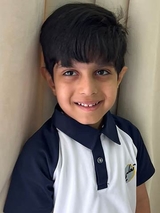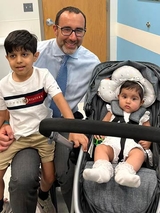Hypospadias: Ali’s Story
Ali and his family traveled from Dubai to Thailand, then to Washington, D.C., and then to Philadelphia, where they finally found confidence and comfort in the care team and their surgical approach. “In hindsight, if I could go back in time, the first doctor I would have chosen for Ali would be Dr. Long,” says Omar, Ali’s father.
Searching for Consistency

To the surprise of his family, Ali was born with severe hypospadias, meaning that the location of the opening through which he urinates (the urethral meatus) was not present at its typical location at the tip of the penis. In a child born with hypospadias, the urethral meatus can be located just below the tip of the penis (glanular or coronal), the shaft of the penis (penile), the scrotum (scrotal), and occasionally below the scrotum (perineal). Ali’s hypospadias was characterized as proximal — with his urethral meatus located on the shaft of his penis close to the scrotum. Ali also had chordee, meaning his penis had curvature. This is a condition that often accompanies hypospadias.
Because hypospadias care is not as accessible in Ali’s home country, the United Arab Emirates, Ali received limited treatment for his condition. His parents found the diagnosis and treatment proposals to be different from one doctor to the next. Ali’s father, Omar, recounts not being given a complete understanding of what the condition entails.
“What I understood from the doctors was that all that he needed would be a cosmetic surgery — and it was all about cosmetics and the appearance,” recalls Omar. “I didn’t understand that it was much deeper than that.”
Omar relied heavily on his own research, educating himself on hypospadias and speaking with doctors from all over. He came to realize that Ali would need more than just one surgery to correct his hypospadias, and that it was much more than just a cosmetic reconstruction.
Omar refused to have Ali operated on within the UAE because of the complexity of the condition. Understanding the long road of surgeries and hospital visits ahead of them, the family traveled to the United States to seek care.

Treatment in the U.S.

Ali began treatment at a hospital in Washington, D.C. He underwent a successful bilateral inguinal hernia repair there before turning 1 year old, but then COVID-19 forced the family back home to UAE, pausing continued treatment.
“It was a very frustrating period because we had to wait, and we didn’t know how long we would have to wait until the pandemic ended so we could get his additional surgeries underway,” says Omar. “According to the doctors, these surgeries must be done before a certain age for Ali.”
Omar continued to research urologists in the U.S. throughout the pandemic. In September of 2021, coronavirus cases had decreased and the family could travel again. They went to another U.S. hospital, where Ali underwent first-stage hypospadias repair. This surgery successfully corrected Ali’s chordee, or penile curvature, but he had very little skin available for the second stage urethroplasty.
Ali and his family faced challenges with the cost of medical care as non-U.S. citizens without medical insurance, but eventually they received financial assistance from the UAE government. In the meantime, Omar’s research had led him to Children’s Hospital of Philadelphia (CHOP). Omar was impressed with the offerings and success stories from CHOP’s Division of Urology and decided that this was the best next step for Ali.
Care at CHOP
Ali’s first doctor at CHOP was Douglas Canning, MD, former Chief of the Division of Urology. After an evaluation, Dr. Canning concluded that Ali would need two more surgeries with a one-year interval between the two cases.
A two-stage repair is often used for patients with severe curvature in their penis, as this has proven to be a more effective approach than a single operation, but the plan for treatment is not determined until the surgeon completes a full assessment of the patient. The first stage for Ali would be to rebuild the skin on the penis to allow eventual creation of a urethra that would extend into the head of the penis, and the second stage would be to create the urethra. During the time between surgeries, Ali’s condition would be monitored closely.
Despite a childhood consisting of hospital visits and doctor’s appointments, Ali began to feel at ease, thanks to the comforting nature of Dr. Canning and the nurses.
“Ali was so comfortable with [Dr. Canning],” says Omar. “When he first started having surgeries, he was comfortable going into the operating room, and comfortable with getting catheterization. Ali never gave me any problems or issues at all.”

When Dr. Canning suddenly passed away in the spring of 2022, Ali’s care was taken over by CHOP Attending Pediatric Urologist Chris Long, MD.
“I had not researched Dr. Long at all, so I had my own fears and reservations,” recalls Omar of the transition in care. “I asked some international doctors who also specialize in this practice, and they all reassured me that Dr. Long was the best to come to: the best in the way that he dealt with his patients, his bedside manner, and also in the operating room.”
Now having known Dr. Long for over a year, Omar emphasizes, “I have never seen a doctor like Dr. Long. He is such an amazing person. Ali is so comfortable with him.”
Dr. Long performed Ali’s two surgeries at CHOP: a second stage of hypospadias repair that transferred extra penile skin onto the front of the penis, and a final stage urethroplasty that advanced the urethra into the head of the penis. Both surgeries were successful.
Now, four months after his latest surgery, Ali is 4 years old and doing excellent physically. He urinates in a normal manner with a single, strong stream and is very happy with his own progress. He loves to play soccer and ride bicycles, and he just started school.
Upon his return home to the UAE, Ali will be cared for by urologists with whom Dr. Long has coordinated.
“Dr. Long told me that if there should be any issues, I should personally communicate with him directly,” says Omar.
Omar is tremendously grateful to Dr. Long, who brought an end to the frustration over Ali’s condition after years of chasing answers. “There’s nothing I can say or do that will do justice or truly reflect the picture of what Dr. Long has done for us,” says Omar.
Contributed by: Emma C. Walsh